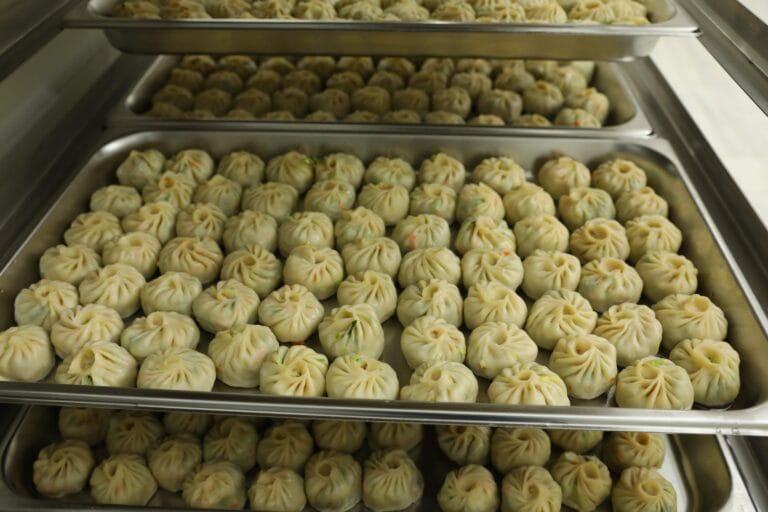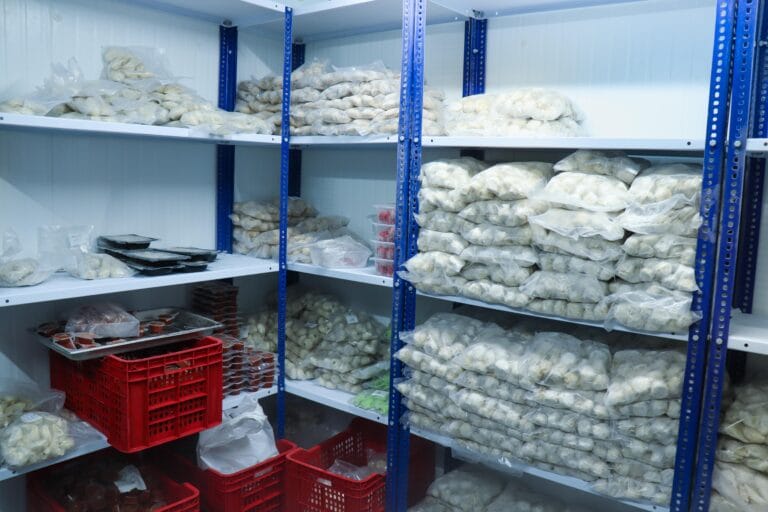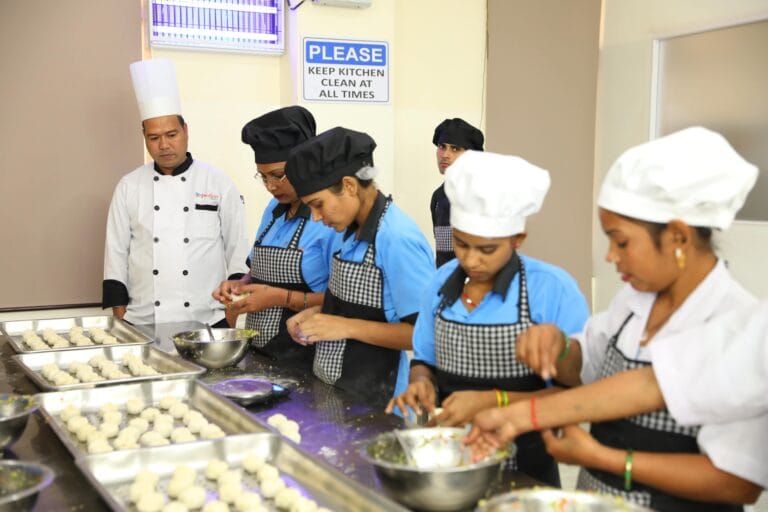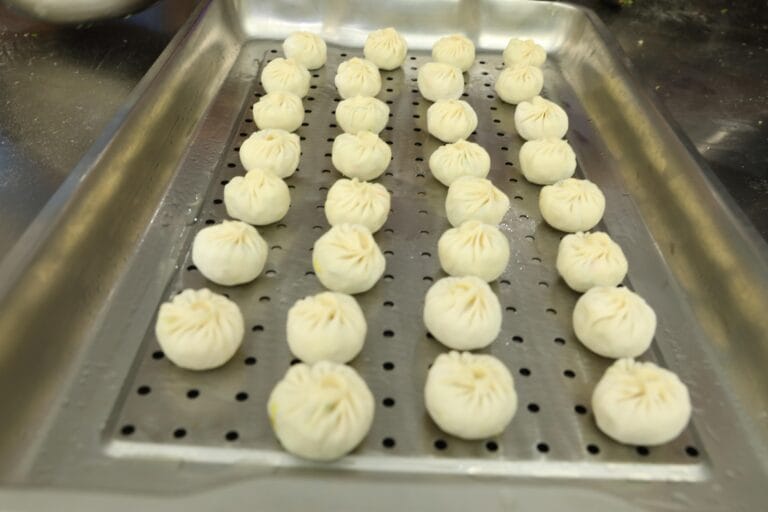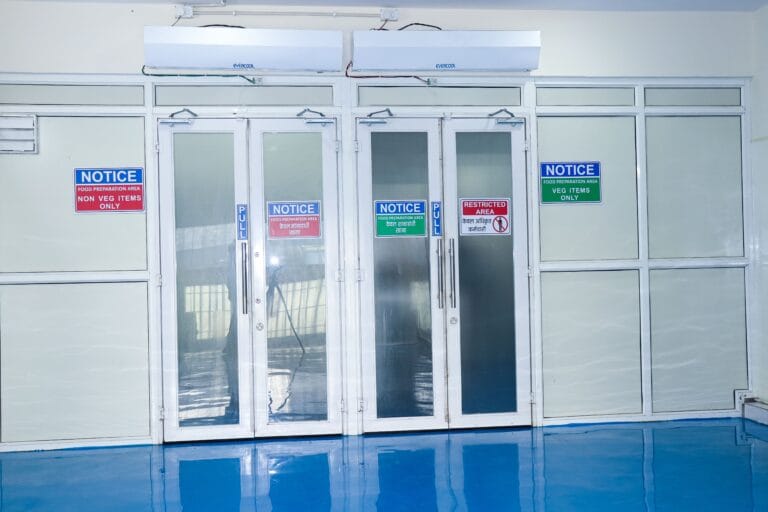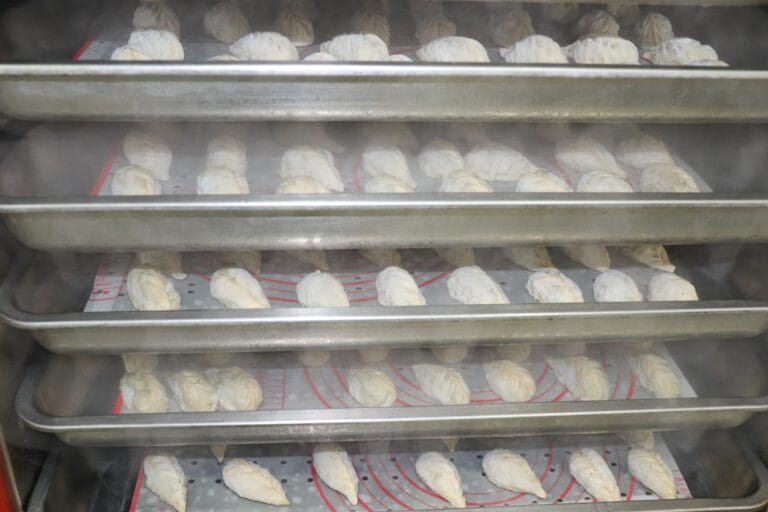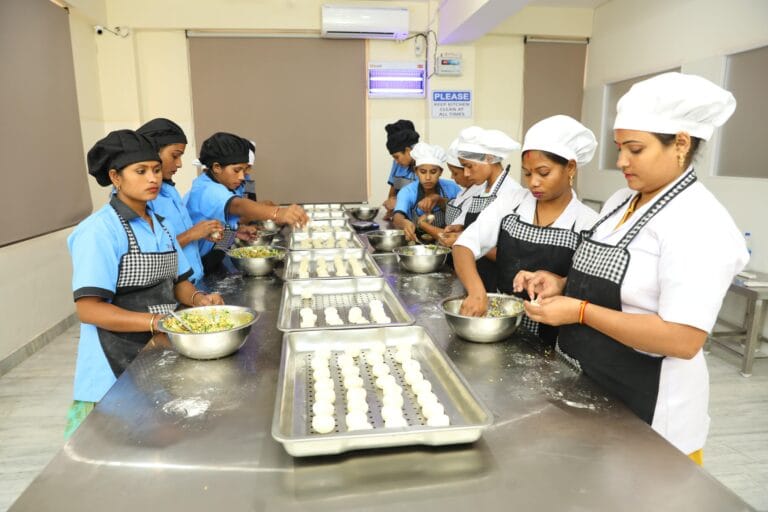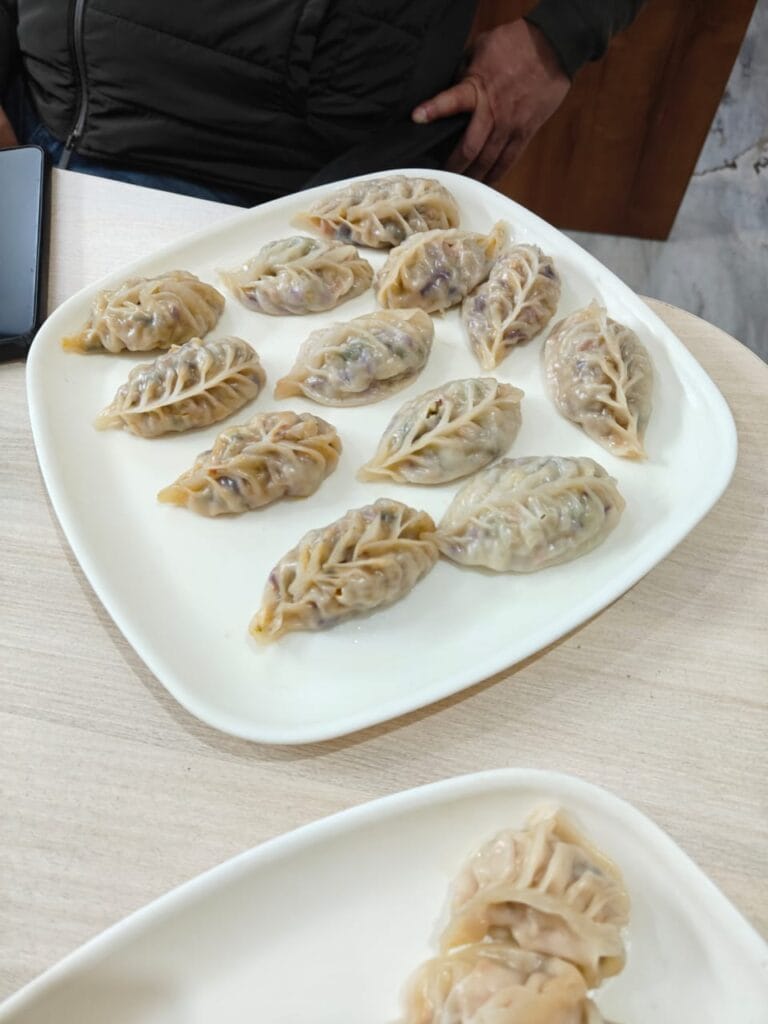PREMIUM MOMOS FROM DELHI NCR BEST WHOLESALE FACTORY
Largest Manufacturer Factory of Customized & Readymade Momos In Delhi. Fresh, Doorstep Delivery. Top Supplier at Premium Cafes and Hotels in Delhi NCR. Rate Starts @ Rs 4.5
FREE dELIVERY IN Delhi NCR
Purchase above Rs 6000 & get Free Delivery in Delhi NCR !
Explore our wide range of offerings
Top Sellers
- Desi Veg 🥦
- Thai Veg 🍜
- Desi Paneer 🧈
- Masala Soya 🫛
- Malai Paneer 🧄
- Spicy Paneer 🌶️
- Premium Veg 🫑
- Corn & Cheese 🧀
- Fish Momos 🐠
- Desi Chicken 🐓
- Thai Chicken 🐦
- Juicy Chicken 😋
- Meaty Mutton 🍖
- Spicy Chicken 🍗
- Prawn Momos 🍤
- Butter Chicken 🐔
Metrics Related to Our Work and Impact
Explore the key metrics that showcase our commitment to quality and customer satisfaction.
Momos Made till Date
Comprising 4 Floors & 50+ Staff
Personalize your order to suit your taste and requirements.
We uphold strict hygiene protocols to ensure safe and clean food preparation.

Mentioned in Mint Paper

What types of momos do you supply?
We supply a variety of momos, including veg, chicken, paneer, and specialty flavors like cheese or spicy variants.
Do you offer frozen momos?
Yes, we provide frozen momos to ensure long shelf life and easy transportation.
Are your momos handmade or machine-made?
Our momos are made using a skilled craftsmanship by hands and advanced machinery used for quality and consistency of vegetable chopping.
Can I customize the filling?
Yes, we accept customization requests for bulk orders. Please discuss your requirements with our team.
What is the minimum order quantity (MOQ)?
The MOQ depends on the type of momo but typically starts at 1 kg per flavor.
Do you offer discounts for bulk orders?
Yes, we provide tiered discounts based on order volume.
What payment methods do you accept?
We accept UPI, bank transfers, online payments, and major credit/debit cards.
Do you require an advance payment?
Yes, for small orders 100% upfront and for bulk orders 50% advance payment is required. The balance is due upon before dispatch.
What is your delivery radius?
We deliver across the NCR . Delivery times may vary depending upon Porter Rider.
Do you offer same-day delivery?
Same-day delivery is available for Orders Upto 100kg.
How are the momos packaged for delivery?
Momos are vacuum-sealed and packed in insulated boxes to maintain freshness and temperature.
What are your shipping charges?
Shipping charges depend on the order size and delivery location by Porter. Bulk orders above Rs 6000 gets free shipping.
What is the shelf life of your momos?
Our frozen momos have a shelf life of 3-6 months when stored at -18°C.
How should I store the momos?
Keep the momos in a deep freezer at -18°C or below.
Are your momos made from fresh ingredients?
Yes, we use only fresh, high-quality ingredients sourced from trusted vendors.
Are your products certified?
Yes, our momos comply with food safety standards and are FSSAI certified.
Can I visit your facility?
Yes, facility visits are allowed by appointment to ensure transparency from Monday to Saturday.
How do you ensure hygiene and quality?
We follow strict hygiene protocols, use state-of-the-art equipment, and conduct regular quality checks.
Wholesale Momos Supplier in Delhi: Your Gateway to Delicious Profits
Delhi’s streets buzz with an energy that’s unmistakable. However, there’s one sound that cuts through the urban symphony like butter through warm bread – the sizzling of momos on street-side griddles. These tiny pockets of joy have transformed from humble Tibetan dumplings into Delhi’s most beloved street-food phenomenon.
The wholesale momo supply industry in Delhi isn’t just thriving; it’s absolutely booming. With the Indian frozen-food market soaring, smart entrepreneurs are diving headfirst into this golden opportunity.
The Momo Revolution: From Streets to Mainstream Success
Picture this: tiny dumplings that once belonged exclusively to Tibetan refugees have now conquered every corner shop, restaurant, and food cart across Delhi. This isn’t just a food trend – it’s a cultural takeover reshaping the entire food-supply chain.
Delhi’s transformation into India’s momo capital began in pockets like Majnu Ka Tila and gradually spread throughout the city. Today, areas like Chirag Dilli Village have emerged as veritable “momo factories,” with dozens of homes producing thousands of pieces daily.
Market Dynamics That’ll Make Your Head Spin
The momo market in India carries staggering value and grows year after year. What’s driving this explosive growth? It’s simple – Delhi’s 30 million residents have an insatiable appetite for these delectable dumplings. Street vendors, restaurants, cafes, and delivery platforms are constantly seeking reliable suppliers who can meet tight schedules, creating a perfect storm of opportunity for wholesale suppliers.
Understanding the Wholesale Momo Supply Chain
Successfully navigating Delhi’s momo wholesale landscape requires understanding its intricate supply network. The chain typically flows from large-scale manufacturers to distributors, then on to retailers and food-service providers.
Key Players in the Ecosystem
Large-Scale Manufacturers
Companies operating in industrial zones employ dozens of staff across multi-floor facilities, producing thousands of momos daily with stringent quality controls.
Regional Distributors
These intermediaries bridge the gap between manufacturers and end customers, handling logistics, cold-chain management, and local market penetration.
End Customers
The diverse customer base includes street vendors, restaurants, cafes, hotels, institutional caterers, and retail outlets.
Supply-Chain Efficiency Factors
Transportation logistics play a crucial role in maintaining product quality. Delhi’s infrastructure supports robust cold-chain networks, ensuring frozen momos reach destinations in perfect condition. However, traffic congestion and regulatory hurdles can impact delivery schedules.
FSSAI Compliance: The Non-Negotiable Foundation
Operating a wholesale momo supply business requires strict adherence to FSSAI regulations. The Food Safety and Standards Authority of India mandates specific licensing based on business scale and turnover.
Licensing Requirements
Petty Food Business Registration
Suitable for operations with annual turnover up to ₹12 lakhs and daily production capacity under 100 kg.
State FSSAI License
Required for larger operations with higher production volumes and interstate distribution.
Central FSSAI License
Necessary for manufacturers processing more than 2 MT per day or dealing with 100 percent export-oriented units.
Quality Standards and Documentation
FSSAI regulations demand meticulous record-keeping covering raw‐material procurement, production processes, and distribution channels. Temperature maintenance throughout the supply chain is critical for frozen products.
Product Range and Pricing Strategies
Delhi’s diverse population demands variety, and successful wholesale suppliers deliver exactly that. The product portfolio typically spans multiple categories to cater to different market segments.
Popular Varieties and Their Market Positioning
Vegetarian Options: Veg momos starting from ₹2.99 for 20 g pieces, with premium variants like cheese and corn commanding higher rates.
Non-Vegetarian Selections: Chicken momos priced depending on size and preparation.
Premium Offerings: Specialized items like mutton momos and creative flavor-infused options targeting upmarket segments.
Pricing Psychology in Wholesale Markets
Wholesale pricing balances cost optimization with market penetration. Starting prices as low as ₹22 per plate, with potential selling prices around ₹65, create substantial profit margins for retailers.
Target Markets: Where Opportunity Meets Demand
Street-Food Vendors: The Volume Game
Street vendors represent the largest volume segment. They prioritize reliability over premium ingredients, making them ideal customers for standard product lines.
Restaurant and Cafe Chains: Quality Seekers
Restaurants demand consistent quality, reliable schedules, and often customization options. This segment commands slightly higher prices in exchange for consistency.
Institutional Buyers: Steady Revenue Streams
Hotels, corporate canteens, and educational institutions offer predictable demand patterns but negotiate aggressively on pricing.
Setting Up Your Wholesale Operation
Infrastructure Requirements
Modern momo production demands specialized equipment and facilities. Automated momo-making machines can significantly improve efficiency and consistency. Cold-storage infrastructure is critical; maintaining –18 °C throughout the supply chain ensures product integrity and shelf life.
Location Strategy
Proximity to transportation hubs reduces logistics costs and ensures quick distribution. Industrial zones near Delhi’s main markets provide excellent connectivity.
Staffing Considerations
A skilled workforce impacts both production quality and operational efficiency. Delhi’s pool of experienced food-processing workers provides a competitive advantage.
Marketing and Distribution Excellence
Building Brand Recognition
Successful suppliers invest in brand development, leveraging media mentions and quality certifications to build customer trust.
Distribution Network Development
Multi-channel strategies work best: direct supply to large customers, partnerships with regional distributors, and integration with e-commerce platforms.
Customer Relationship Management
Long-term success depends on strong relationships: regular communication, flexible payment terms, and responsive customer service differentiate top suppliers.
Technology Integration: The Modern Edge
Production Technology
AI-powered consistency systems ensure uniform quality, reducing waste and boosting satisfaction.
Inventory Management Systems
Digital tracking optimizes stock levels, reduces wastage, and improves cash flow by integrating customer orders.
Cold-Chain Technology
Advanced refrigeration and IoT-based monitoring guarantee product quality throughout the distribution network.
Financial Planning and Profitability
Investment Requirements
Starting a wholesale momo supply business requires significant capital: infrastructure, equipment, working capital, and compliance costs range from lakhs to crores, depending on scale.
Revenue Projections
Medium-scale operations report monthly revenues in the lakhs, while large operations generate substantially higher figures.
Profit Margins
Distributor margins typically hover around 15–20 percent, but careful cost management is key to maintaining healthy net margins.
Challenges and Risk Management
Supply-Chain Disruptions
Delhi’s urban environment creates unexpected disruptions. Traffic restrictions, weather, and regulatory changes require contingency planning and buffer inventory.
Quality Control Challenges
Maintaining consistent quality across high volumes demands robust QC systems: regular testing, staff training, and equipment maintenance.
Competition Management
The booming market attracts new entrants. Differentiation through superior quality, reliable service, and competitive pricing sustains market position.
Regulatory Landscape Navigation
Local Regulations
Municipal rules cover licensing, hygiene, and waste management. Ongoing compliance requires monitoring regulatory updates.
Interstate Trade Requirements
Expanding beyond Delhi involves understanding each state’s regulations and licensing for interstate commerce.
Environmental Compliance
Sustainability demands eco-friendly packaging and waste-management practices.
Future Trends and Opportunities
Market Expansion Possibilities
The frozen-food market’s onward trajectory presents expansion opportunities: new product lines, geographic reach, and innovative formats.
Technology Evolution
Blockchain for traceability, AI for forecasting, and automated packaging will reshape the industry.
Consumer Preference Shifts
Health-conscious consumers seek organic, additive-free options. Early adopters of these trends capture premium segments.
Success Stories and Best Practices
Learning from Market Leaders
Top suppliers demonstrate how quality focus and operational excellence create market leadership. Their large-scale facilities and comprehensive product ranges showcase the scale required for major impact.
Franchise Model Success
Franchise operations succeeding on brand consistency and standardized processes show the model’s scalability.
Building Your Competitive Advantage
Quality Differentiation
Premium ingredients, purified water, and hygienic production environments set superior suppliers apart.
Service Excellence
Reliable delivery, responsive support, and flexible ordering build loyalty and reduce churn.
Innovation Focus
New flavors, innovative packaging, and custom offerings help seize emerging opportunities.
Conclusion: Your Recipe for Success
Delhi’s wholesale momo supply industry offers a golden opportunity for entrepreneurs ready to invest in quality, compliance, and service. Explosive growth, fueled by urbanization and evolving tastes, creates room for newcomers who master the fundamentals.
Success demands more than great momos—it requires strong supply-chain knowledge, regulatory compliance, stellar customer relationships, and ongoing adaptation. For those who get it right, the rewards are substantial. In Delhi’s competitive landscape, consistency beats perfection. Build systems that deliver reliable quality, maintain compliance, and offer exceptional service—and you’ll thrive in this delicious business.

